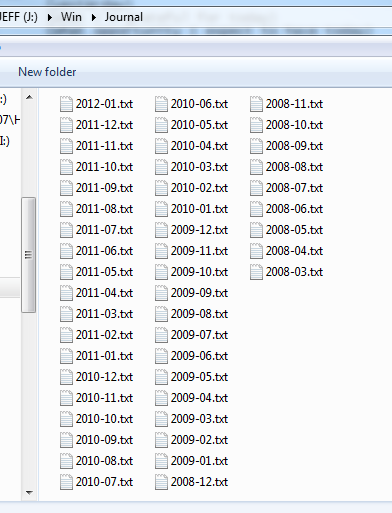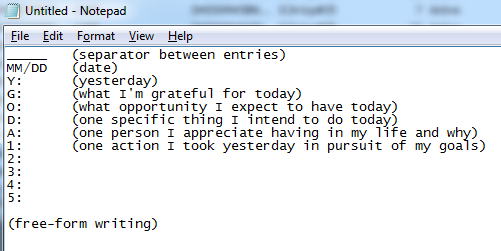I am an optimist.
I don’t think it’s bragging to say that I’m the most optimistic person I know. People who know me often comment on what a positive outlook I have.
Here’s the thing: I don’t come by it naturally.
My daughter does. She is a natural-born optimist. Which has led me to believe that optimism-vs-pessimism is largely determined by environment. I grew up in a very pessimistic environment and became pessimistic by nature.

But I trained myself to change my outlook. You might say that I became unnaturally optimistic.
How did I do it?
One thing’s for sure, it was neither quick nor easy.
A big part of it was simply deciding to change. I’m a big proponent of self-improvement. I’ve read more books and taken more courses than anyone I know. One of the things I learned is that, while we don’t have absolute control over our destiny, we do have a great deal of influence.
Since the future’s coming anyway and since your actions directly impact what kind of future it will be for you, wouldn’t you rather it be a good one. Who would ever wish for a lousy future?
Your attitude affects your thoughts and your beliefs. Your thoughts affect your actions. Your actions determine your destiny.
So one of the biggest steps was realizing and accepting that the future is going to happen whether I want it to or not. I will have a hand in shaping that future, whether I wish to or not. So I can shape it for my benefit (realizing that some things will be out of my control) or I can either passively or actively let it be shaped to my detriment.
Having my daughter also played a pivotal role. I wanted better for her than I had. That’s a pretty tall order because I had a great childhood. In fact, I had an almost idyllic childhood. But I wanted hers to be better. So that necessitated a change in my fundamental attitude.
Making it a Daily Habit
That’s all well and good but habits die hard and deeply ingrained habits are especially thorny.
I needed a new habit to replace the old one. Or rather I needed a whole set of new habits.
One of the things that helped keep me on track was journaling. I write in a journal almost every day. It has evolved over time but the latest incarnation follows a multi-part format. Let me show you the parts and then explain them all.

I do all my journaling in a plain text editor on the computer. (I use both Mac and PC systems so this is universal.) From the image above you can see that I create separate files for each month and name my files using a YYYY-MM format. This tells me the year and month of the entries in that file.
So each file will have roughly 30 entries. Some may have 31 but there are (infrequent) days when I don’t journal so most months have slightly fewer entries than there are days in that month.

Section 1 – Identifiers
- Each day’s entry starts with a space and a short line. This helps me to differentiate the entries so they don’t get all strung together.
- Below the line is the 5-character month and date for that entry.
- Y: signifies what kind of day defined the previous day. This derives from a timekeeping system I first learned from Jack Canfield in which there are three kinds of days:
- Productivity days, where you actively work on your business or goals. This might include approaching or meeting with clients, actively working on a paying project, marketing and advertising activities, etc.
- Preparation days in which you read, learn, attend a class, network or do other activities which benefit your business or indirectly advance your goals.
- Rest & Recreation days have no work activities at all. You might spend them with your family, pursuing hobbies, playing sports or whatever floats your boat.
Section 2 – Gratitude
- G: I list one thing I’m grateful for today. Some days it can be hard. Often I find myself being grateful for essentially the same things over and over again. That’s okay as long as I’m grateful for something.
- O: is the biggest opportunity I think will present itself to me (or, more often, I plan to create for myself) today.
- D: is one major thing I plan on doing today to advance my goals.
- A: is for one person I appreciate having in my life and why. Again, I often find myself appreciating the same people over and over again. That’s not a bad thing. After all, there’s a reason they are in my life!
Section 3 – Accomplishments
Next I list 5 specific things I did the previous day to advance my goals. There are a few days (especially if the previous day was an R&R day) when I have less than 5 but I always have at least one or two. Some days I have more than five. I add or delete numbered lines as necessary but I always start with 5 lines. This gives me a number to shoot for.
This section is key to being hyper-productive. By actually writing down what actions I took, I am holding myself accountable. There are no excuses. Even though no one but me ever gets to read my journal, I would be terribly embarrassed at myself if I did nothing to advance my goals. After all, they’re my goals. If I won’t pursue them, who will do it for me?
Section 4 – Free-form Writing
The final section is a free-form writing section where I just write whatever is on my mind. Often, I just recount events of the previous day. Sometimes I will weigh in with opinions or insights. I may rant or dream. A few days, especially if I am pressed for time, I may skip this section altogether but I do write in it most days. Length is unimportant. I write until I have nothing more to say. Some days that might be a few dozen words, others it may be more than 1,000.
How This Makes Me An Optimist
So you may be wondering how this journaling makes me an optimist. Obviously, section two is the most crucial in that regard. Consciously taking inventory and writing down what I am grateful for forces me to focus on the things that are good in my life. When things are good, even the Debbie Downers of life become more optimistic. Nothing may make them bubbly and cheery but their outlook improves over what it otherwise might be.
Focusing on the good every day has a cumulative effect that keeps your mood buoyed.
There are other things too like refusing to hang out with negative people, not watching TV news, and consciously trying to find just one bright side to every situation.
In general, life is good. By consciously choosing to see it that way, how can you not be optimistic?

Pingback: Positive Attitude – How To Keep A Positive Attitude Around Negative People | QUOTES OF ENCOURAGEMENT